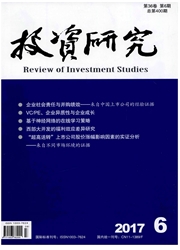

 中文摘要:
中文摘要:
本文选取2007-2012年A股上市公司季度开发支出数据为样本,研究了高管持股变动以及高管的财务背景特征对持股变动前一季度开发支出会计政策的影响。实证结果发现,在高管股权变动的总体样本中,高管股票净减持的公司在持股变动的前一季度更倾向于选择将开发支出资本化;而这一正相关关系主要呈现于财务总监(CFO)发生持股变动的公司中;在财务总监(CFO)没有发生股权变动的样本中,若其他持股变动高管中有人具有财务背景,则其他高管持股变动为净减持的公司在前一期更倾向于将开发支出资本化。实证结果说明,高管出于自利动机进行股票增持或减持时,确实会利用开发支出会计政策的选择来进行盈余管理。
 英文摘要:
英文摘要:
Based on the quarterly data of A-share listed companies in China from 2007 to 2012, this paper investigates the impact of executives' shareholdings change and financial background characteristics on the accounting policy of development costs in the previous quarter. The results show that, for the total sample, the companies in which the executives reduce their shareholdings would capitalize its development cost in the previous quarter before shareholdings change. This positive correlation mainly emerges in the companies where the CFO's shareholdings has changed. For the samples of CFO's shareholdings has not changed, if other executives who changed their shareholdings have financial backgrounds, tend to capitalize the development cost in the previous quarter. The empirical results suggest that, in order to get more wealth during the shareholdings changes, executives will employ the choice of accounting policy on development costs to conduct earnings management for the purpose of self-interest.
 同期刊论文项目
同期刊论文项目
 同项目期刊论文
同项目期刊论文
 期刊信息
期刊信息
